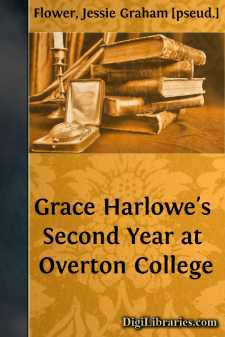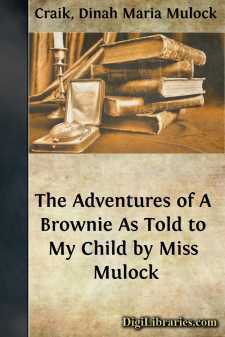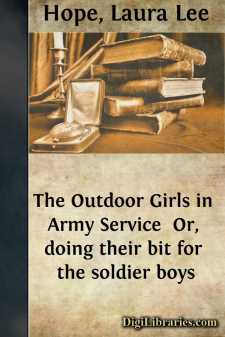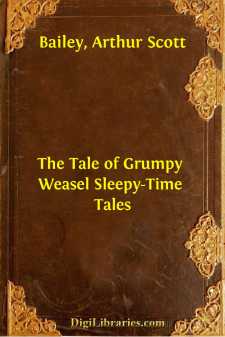Juvenile Fiction
- Action & Adventure 179
- Animals 188
- Biographical 1
- Boys / Men 133
- Classics 1
- Fairy Tales & Folklore 11
- Family 123
- General 262
- Girls & Women 187
- Historical 141
- Holidays & Celebrations 72
- Humorous Stories 2
- Imagination & Play 3
- Legends, Myths, & Fables 48
- Lifestyles 253
- Mysteries, Espionage, & Detective Stories 12
- Nature & the Natural World 3
- Religious 81
- School & Education 127
- Science Fiction, Fantasy, & Magic 12
- Short Stories 6
- Sports & Recreation 31
- Toys, Dolls, & Puppets 10
- Transportation 44
Juvenile Fiction Books
Sort by:
OVERTON CLAIMS HER OWN "Oh, there goes Grace Harlowe! Grace! Grace! Wait a minute!" A curly-haired little girl hastily deposited her suit case, golf bag, two magazines and a box of candy on the nearest bench and ran toward a quartette of girls who had just left the train that stood puffing noisily in front of the station at Overton. The tall, gray-eyed young woman in blue turned at the call,...
more...
CHAPTER I. LIVING IN THE COUNTRY—LIFE AT SCHOOL—THE HUT CLUB IS FORMED—THECOMING OF THE CIRCUS. "YES," said Mrs. Dunn to her neighbour, Mrs. Sullivan, "we are expecting great things of Archie, and yet we sometimes hardly know what to think of the boy. He has the most remarkable ideas of things, and there seems to be absolutely no limit to his ambition. He has long since determined...
more...
by:
L. T. Meade
CHAPTER I. THE GUEST WHO WAS NEITHER OLD NOR YOUNG. It was a beautiful summer’s afternoon, and the girls were seated in a circle on the lawn in front of the house. The house was an old Elizabethan mansion, which had been added to from time to time—fresh additions jutting out here and running up there. There were all sorts of unexpected nooks and corners to be found in the old house—a flight of...
more...
The New Boys. Slegge said it was all “bosh;” for fifty years ago a boy at school had not learned to declare that everything which did not suit his taste was “rot.” So Slegge stood leaning up against the playground wall with a supercilious sneer upon his lip, and said it was all “bosh,” and only fit for children. The other fellows, he said, might make idiots of themselves if they liked, he...
more...
A Boy at Sea. Many many years ago seem like yesterday, and I hope it will always be the same. For, just to be serious for a moment, what is the full stretch of the oldest man’s life to time? Just one star-wink, if the astronomers are right about the passage of light, and that the glitter of stars that we see now are only the rays which started from them away there in space long before we were born....
more...
THERE was once a little Brownie, who lived—where do you think he lived? in a coal-cellar.Now a coal-cellar may seem a most curious place to choose to live in; but then a Brownie is a curious creature—a fairy, and yet not one of that sort of fairies who fly about on gossamer wings, and dance in the moonlight, and so on. He never dances; and as to wings, what use would they be to him in a coal-cellar?...
more...
CHAPTER 1. THE PSAMMEAD There were once four children who spent their summer holidays in a white house, happily situated between a sandpit and a chalkpit. One day they had the good fortune to find in the sandpit a strange creature. Its eyes were on long horns like snail's eyes, and it could move them in and out like telescopes. It had ears like a bat's ears, and its tubby body was shaped like...
more...
by:
Laura Lee Hope
CHAPTER I "I'VE VOLUNTEERED!" "Well, who is going to read the paper?" Amy Blackford stopped knitting for a moment, the half-finished sweater suspended inquiringly in the air, while she asked her question and gazed about impatiently at her busy group of friends. "It's your turn, anyhow, Mollie," she added, fingers flying and head bent as she resumed her work. "You...
more...
by:
Oliver Optic
CHAPTER I. RICHARD GRANT AND FRIEND GET INTO AN AWFUL SCRAPE. "Now, steady as she is," said Sandy Brimblecom, who lay upon the half-deck of the Greyhound, endeavoring to peer through the darkness of a cloudy night, which had settled deep and dense upon the Hudson, and obscured every object on the shore. "Steady as she is, Dick, and we shall go in all right." "Ay, ay; steady it...
more...
I A SLIM RASCAL Old Mr. Crow often remarked that if Grumpy Weasel really wanted to be of some use in the world he would spend his time at the sawmill filling knot holes in boards. "He's so slender," Mr. Crow would say, "that he can push himself into a knot hole no bigger round than Farmer Green's thumb." Naturally it did not please old Mr. Crow when Solomon Owl went out of his...
more...











